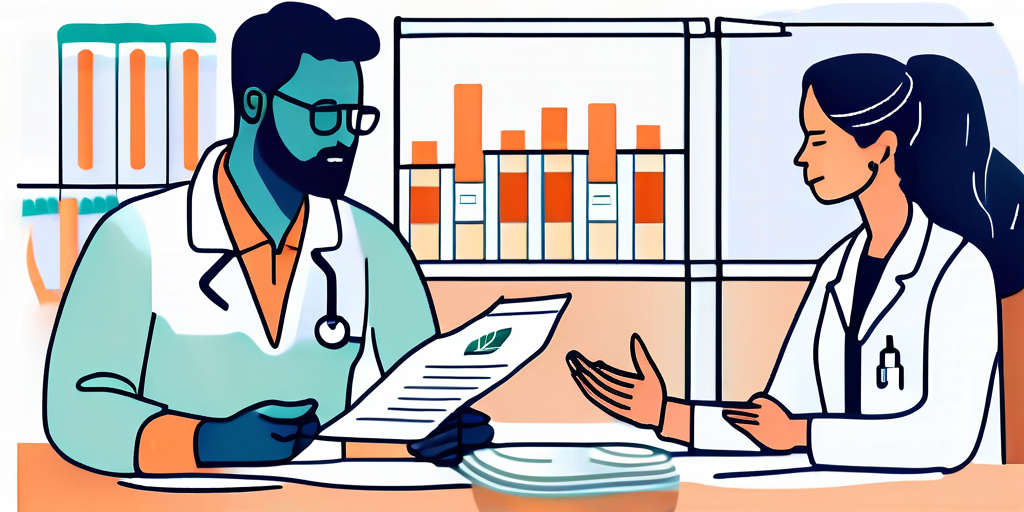|
|
|
|
|
Creation date: Jan 25, 2024 1:46am Last modified date: Jan 25, 2024 1:46am Last visit date: Feb 14, 2026 6:48pm
2 / 20 posts
Jan 25, 2024 ( 1 post, 1 reply Sep 17, 2024 ) 1/25/2024
1:46am
Kristie Vanhoy (kristievanhoy)
Pharmacists are vital members of the healthcare team, playing a crucial role in medication counseling and education. With their specialized knowledge of medications and their interactions, pharmacists provide invaluable guidance to patients to ensure safe and effective use of medications. Understanding the role of pharmacists and their evolving responsibilities is essential in recognizing the significant impact they have on patient health outcomes. Understanding the Role of PharmacistsPharmacists are highly trained professionals who are responsible for dispensing medications, managing medication therapy, and providing medication counseling. Their role extends beyond simply filling prescriptions. They collaborate with healthcare providers to optimize patient care and promote positive health outcomes.
Pharmacists possess a wealth of knowledge about medications and their effects on the human body. They undergo extensive education and training to ensure they have a deep understanding of pharmacology, drug interactions, and proper medication administration. This expertise allows them to play a crucial role in ensuring patient safety and preventing medication errors. When a prescription, including the need to refill prescription, is brought to a pharmacy, the pharmacist carefully reviews the medication order to ensure its accuracy and appropriateness for the patient's condition. They take into consideration factors such as the patient's age, weight, allergies, and other medications they may be taking. This thorough review process, including the consideration of requests to "refill prescription," helps to prevent adverse drug reactions and ensures that patients receive the most effective treatment. The Evolving Responsibilities of PharmacistsOver the years, the responsibilities of pharmacists have expanded, reflecting the growing complexity of healthcare. In addition to dispensing medications, pharmacists now take an active role in medication therapy management, conducting medication reviews, and providing comprehensive patient education. Medication therapy management involves assessing the patient's medication regimen, identifying any potential issues or concerns, and working with the patient and healthcare team to develop a personalized plan for optimal medication use. Pharmacists may collaborate with physicians to adjust dosages, recommend alternative medications, or suggest lifestyle modifications to enhance the effectiveness of the treatment. Pharmacists also conduct medication reviews, which involve a thorough evaluation of a patient's medication regimen to identify any potential drug interactions, duplications, or other issues that may compromise the patient's health. By conducting these reviews, pharmacists can make recommendations to healthcare providers to optimize therapy and minimize the risk of adverse effects. Pharmacists as Healthcare ProfessionalsPharmacists are an integral part of the healthcare team. They work closely with physicians, nurses, and other healthcare professionals to ensure coordinated and personalized care for patients. Pharmacists play a vital role in helping patients understand their medications and make informed decisions about their health. When patients receive a new medication, pharmacists take the time to explain how the medication works, potential side effects, and any necessary precautions. They provide clear instructions on how to take the medication, including dosage and timing, to ensure patients achieve the desired therapeutic outcomes. Pharmacists also address any concerns or questions patients may have, empowering them to actively participate in their own healthcare. Furthermore, pharmacists are often involved in public health initiatives and community outreach programs. They may provide immunizations, conduct health screenings, and offer counseling on topics such as smoking cessation, weight management, and chronic disease management. By actively engaging with the community, pharmacists contribute to the overall well-being and health of the population. The Importance of Medication CounselingMedication counseling is a critical aspect of pharmacy practice, aimed at ensuring correct medication use and preventing drug interactions and side effects. Pharmacists provide personalized counseling sessions to patients, which go beyond the information provided on medication labels.
Medication counseling plays a pivotal role in patient care, as it empowers individuals to take an active role in their health and well-being. By providing comprehensive education and guidance, pharmacists help patients make informed decisions about their medications. Ensuring Correct Medication UseOne of the primary goals of medication counseling is to ensure that patients understand how to take their medications correctly. Pharmacists explain the dosage instructions, frequency of administration, and potential food or drug interactions that may impact medication effectiveness. During counseling sessions, pharmacists take the time to address any questions or concerns patients may have about their medications. They provide clear and concise explanations, using layman's terms to enhance patient comprehension. By doing so, pharmacists help patients develop a solid understanding of their medication regimens, reducing the risk of errors and promoting optimal therapeutic outcomes. Preventing Drug Interactions and Side EffectsPharmacists are well-versed in the complexities of drug interactions and potential side effects. During medication counseling, they assess patients' medication regimens to identify any potential interactions or adverse effects that may occur. By proactively addressing these concerns, pharmacists help minimize the risks associated with medication use. Furthermore, medication counseling allows pharmacists to tailor their advice to individual patients. They take into account factors such as age, gender, medical history, and concomitant medications to provide personalized recommendations. This personalized approach ensures that patients receive the most appropriate and safe treatment options, reducing the likelihood of adverse reactions. In addition to preventing drug interactions, medication counseling also focuses on mitigating potential side effects. Pharmacists educate patients about common side effects associated with their medications and provide strategies to manage them effectively. By doing so, pharmacists empower patients to make informed decisions about their treatment, enhancing medication adherence and overall patient satisfaction. Medication counseling is an ongoing process that extends beyond the initial prescription fill. Pharmacists encourage patients to follow up regularly to address any concerns or changes in their health status. This continuous engagement fosters a strong patient-pharmacist relationship, allowing for open communication and the opportunity to optimize medication therapy over time. The Process of Medication EducationMedication education involves a systematic approach to patient assessment, education planning, and the delivery of medication information. Pharmacists use their expertise to tailor educational interventions to the unique needs of each patient, promoting understanding and compliance. Medication education is a vital component of healthcare, as it empowers patients to take an active role in managing their medications and promotes safe and effective use. Pharmacists play a crucial role in this process, utilizing their extensive knowledge and skills to provide comprehensive and personalized education. Patient Assessment and Education PlanningBefore providing medication education, pharmacists assess various patient factors, such as their health literacy, cultural beliefs, and cognitive abilities. This comprehensive understanding allows pharmacists to develop personalized education plans that cater to each patient's specific needs. During the patient assessment, pharmacists take into account the patient's medical history, current medications, and any existing health conditions. They also consider the patient's lifestyle, including their daily routine and dietary habits. By gathering this information, pharmacists can identify potential barriers to medication adherence and develop strategies to overcome them. Education planning is a collaborative process between the pharmacist and the patient. Pharmacists take the time to explain the purpose and potential side effects of each medication, ensuring that the patient has a clear understanding of their treatment plan. They also discuss the importance of adherence and address any concerns or misconceptions the patient may have. Delivering Medication Information EffectivelyPharmacists employ various communication strategies to ensure effective delivery of medication information. They understand that each patient has a unique learning style and adapt their approach accordingly. They use simple language, visual aids, and patient-friendly materials to enhance understanding. During the education session, pharmacists encourage active patient participation by asking questions and addressing concerns. They create a supportive and non-judgmental environment where patients feel comfortable expressing their doubts or fears. Pharmacists also provide practical tips and reminders to help patients incorporate their medication regimen into their daily routine. Furthermore, pharmacists recognize the importance of ongoing education and follow-up. They schedule regular check-ins with patients to assess their progress, address any new concerns, and reinforce medication education. This continuous support helps patients stay informed and confident in managing their medications. In conclusion, medication education is a multifaceted process that involves patient assessment, education planning, and effective delivery of medication information. Pharmacists play a crucial role in empowering patients to make informed decisions about their medications, promoting adherence, and ultimately improving health outcomes. Challenges in Medication Counseling and EducationWhile medication counseling and education are vital components of pharmacy practice, they come with unique challenges. Pharmacists must navigate communication barriers and address patient non-adherence to achieve optimal outcomes.
Overcoming Communication BarriersEffective communication is crucial for successful medication counseling. However, language barriers, health literacy limitations, and cultural differences can present challenges. Pharmacists employ various strategies to overcome these barriers, such as using interpreters, simplified explanations, and cultural sensitivity. Addressing Patient Non-AdherencePatient non-adherence to medication regimens is a common concern that poses significant risks to health outcomes. Pharmacists play a vital role in identifying the underlying causes of non-adherence and implementing strategies to improve patient compliance. This may involve simplifying medication regimens, addressing cost concerns, and providing ongoing support and counseling. The Impact of Pharmacists on Patient Health OutcomesPharmacists have a profound impact on patient health outcomes through their involvement in medication counseling and education. By improving medication adherence, enhancing patient safety, and promoting a better quality of life, pharmacists contribute to overall patient well-being. Improving Medication AdherenceMedication adherence is crucial for successful treatment outcomes. Pharmacists play a pivotal role in promoting adherence by providing clear instructions, addressing concerns, and offering regular follow-up. Their patient-centered approach helps patients understand the importance of adherence and the potential benefits it brings. Enhancing Patient Safety and Quality of LifeThrough medication counseling and education, pharmacists contribute to enhancing patient safety and improving their quality of life. By identifying and addressing potential drug interactions, side effects, and medication errors, pharmacists help minimize risks and optimize treatment effectiveness. This, in turn, leads to improved patient outcomes and a better overall quality of life. In conclusion, pharmacists play a vital role in medication counseling and education. Their evolving responsibilities, patient-centered approach, and collaboration with healthcare professionals make them indispensable members of the healthcare team. By ensuring correct medication use, preventing drug interactions and side effects, and improving medication adherence, pharmacists positively impact patient health outcomes, ultimately enhancing patient safety and quality of life. 9/17/2024
1:40pm
W W (williamwebecomr)
Hi! Some men are faced with health problems that they do not want to go to a regular hospital with and are looking for a reliable alternative. Here, the online platform Hims will always come to their aid, which is ready to provide telemedicine assistance to each client. There is information on how to use it on their website, and if someone has any questions, the user does not need to look for hims customer service number there is always a company employee on the website ready to answer everyone. |




